
Welcome to the Plant Biology (SC/BIOL 2010.04) course website (from 1998 through 2015). This is your central source for announcements, lab and lecture information, handouts, past tests, useful links etcetera.
Announcements
11 July 2018: From time to time, additions will be made to the Plants in the News section.
Archives
2015 Archives | 2014 Archives | 2013 Archives | 2012 Archives |
2015 Archives
5 May 2015: Thank you for making this such an enjoyable course! I hope that you enjoy the emerging spring all around us!
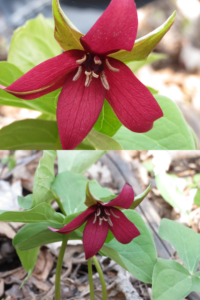
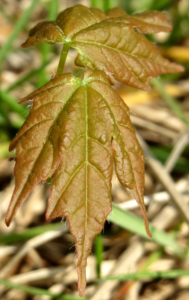 5 May 2015: Finally, the trilliums are in full bloom, including a relatively rare red trillium! But it is not just the
flowers and emerging leaves, seedlings of sugar maple are sprouting up at the edges --and the interior-- of the woodlot.
5 May 2015: Finally, the trilliums are in full bloom, including a relatively rare red trillium! But it is not just the
flowers and emerging leaves, seedlings of sugar maple are sprouting up at the edges --and the interior-- of the woodlot.
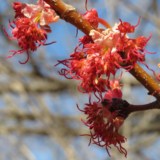
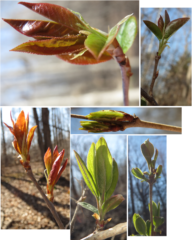 25 April 2015: With warming weather, flowering and leaf emergence are happening quickly. Here's a snapshot
of activity in Boyer woodlot. Red maple flowers (female) are in full bloom. And, leaves of a variety of understory woody plants and trees are
emerging, to take advantage of sunlight before they get shaded by the canopy trees.
25 April 2015: With warming weather, flowering and leaf emergence are happening quickly. Here's a snapshot
of activity in Boyer woodlot. Red maple flowers (female) are in full bloom. And, leaves of a variety of understory woody plants and trees are
emerging, to take advantage of sunlight before they get shaded by the canopy trees.
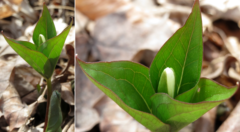 19 April 2015: Trillium flowers are just emerging!
19 April 2015: Trillium flowers are just emerging!
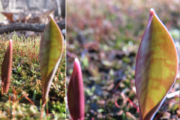
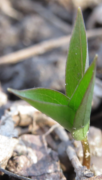 16 April 2015: Trout lilies are now emerging (many from moss beds with or without sporophytes).
Trilliums are emerging too! Both should flower soon (within a week?).
16 April 2015: Trout lilies are now emerging (many from moss beds with or without sporophytes).
Trilliums are emerging too! Both should flower soon (within a week?).
15 July 2014: I have been asked by the University to remind students of the University Senate Policy regarding Academic Honesty: Both the University Policy and additional resources for students.
20 April 2015: Final Exam (Monday 27 April from 7:00 PM in CLH A) Update:
The final exam is finished. There are 87 questions. About 50% come from material covered in the first and second term tests. Besides keying algae, conifers and pollen, lab-related questions include some diagrams, and 5 questions that would normally be on the second lab quiz (such as pollen morphology and tissue staining).
Please be reminded that there are two major procedural differences between the term tests and the final exam:Past final exams should give you a realistic idea of coverage. I hope you all do well!
- You will need to have your session/photo ID available.
- Both the final exam and the scantron sheet must be handed in when you are finished.
17 April 2015: Here is a link to overheads used for the lectures on shoot biology of angiosperms (and coffee) [pdf].
17 April 2015: Dear Plant Biologists: The final exam will be held Monday 27 April from 7:00 PM in CLH A.
Please note that there are two major differences between the term tests and the final exam:The final exam will have about 75-80 questions. About 40-50% will come from material covered in the first and second term tests. Past final exams should give you a realistic idea of coverage. There will be more material from the lab component than is usual, including algae, conifer and pollen keying, as well as questions on pollen morphology and tissue staining. When the exam is finalized, I will provide you with more detailed information.
- You will need to have your session/photo ID available.
- Both the final exam and the scantron sheet must be handed in when you are finished.
13 April 2015: Here is a link to overheads used for the lectures on root biology of angiosperms [pdf].
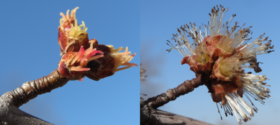 12 April 2015: Here are some maple flowers (female and male). These photos were taken south of Calumet College
and north of Bethune College today.
12 April 2015: Here are some maple flowers (female and male). These photos were taken south of Calumet College
and north of Bethune College today.
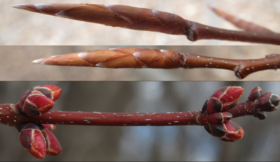 11 April 2015: Beech saplings in the understory are biding their time before breaking dormancy.
But on southern exposures, some maples are getting ready to flower. These photos were taken in Boyer Woodlot today.
11 April 2015: Beech saplings in the understory are biding their time before breaking dormancy.
But on southern exposures, some maples are getting ready to flower. These photos were taken in Boyer Woodlot today.
7 April 2015: Lab Material Review
Because some of the material that would usually be covered by the second lab quiz is going to be covered in the final exam, pertinent lab material (Bryophytes, Seedless vascular plants, Gymnosperms, and Pollen identification) will be available for review the afternoons of 15-17 April in Room 118 Lumbers. The lab technician Debbie Freele can let you in, her office/lab is Room 116 Lumbers (just across from the Plant Biology Lab room).
6 April 2015: Here is a link to overheads used for the lectures on seed biology of angiosperms [pdf].
20 March 2015: If you were unable to cross the picket line, remediation related material (gists and lecture notes) is available at --www.yorku.ca/plants/remediation_gists.html.
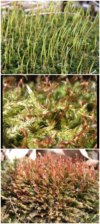 2 April 2015: I guess most plants want to make sure it is going to stay warm before they
break dormancy, but the mosses are making sporophytes like crazy. Mosses are tough. These photos were taken
in Boyer Woodlot today.
2 April 2015: I guess most plants want to make sure it is going to stay warm before they
break dormancy, but the mosses are making sporophytes like crazy. Mosses are tough. These photos were taken
in Boyer Woodlot today.
1 April 2015: The final exam date and time have been set: Monday 27 April at 19:00.
1 April 2015: Dear Plant Biologists: As a consequence of the CUPE 3903 ratification, the Plant Biology Labs will resume today (Wednesday 1 April). The schedule and markings schemes have been modified to account for the limited time we have available for remediation.
The revised schedule provides two labs:Most lab sections will complete the week of 6-10 April (the Tuesday lab will complete the week of 13-17 April due to the timing of lab resumption).
- Pollen I
- Angiosperm I and Fruit and Vegetable (You must bring both a plant in flower and a fruit or vegetable for this lab)
The revised marking scheme replaces a 4% write-up on pollen with a drawing. The second lab quiz is cancelled. The lab percentage mark will still be 40% of your course mark.I look forward to seeing you in lab! Best regards, Roger
31 March 2015: Per official channels (York and CUPE 3903), the settlement has been ratified. Labs will resume Wednesday 1 April.
30 March 2015: Per official channels (York and
CUPE 3903), a tentative settlement has been reached subject to ratification vote.
The impact on Plant Biology depends on the timing and results of ratification. If labs can resume Tuesday afternoon, they will
The ratification vote will be held Tuesday afternoon. If the settlement is ratified, then labs should be able to resume Wednesday
afternoon.
23 March 2015: In the absence of a settlement, we can assume labs will not run this week. If labs re-commence next week (30 March -- 3 April), lab exercises will be reduced from five to three. A quiz --if held-- would occur the second lab exercise session. A tentative schedule revision [png] gives an example of how this could work. Everything depends upon if and when a settlement is reached.
20 March 2015: If you are unable to cross the picket line, remediation related material (gists and lecture notes) is available at --www.yorku.ca/plants/remediation_gists.html.
18 March 2015: Simon Hiscock provides a short review of incompatibility mechanisms in flowering plants that you may find helpful --Pollen recognition during the self-incompatibility response in plants.
18 March 2015:
It is official: The last day of classes is Friday 17 April 2015.
Final exams will run from Sunday 19 April through Sunday 3 May Tuesday 28 April.
16 March 2015:
Dear Plant Biologists: I've excerpted the latest University Executive Committee communication below (it is
available at the Secretariat website).
Relevant to Plant Biology, our lectures will resume Wednesday 18 March, but labs will not resume at this time.
The term will be extended:
"...Senate Executive Committee determined that classes in the following Faculties will resume on Tuesday, March 17: [...] Faculty of Science.
[...] Please bear in mind that some courses will not resume - notably those that are directed by CUPE 3903 Unit 1 members who remain on strike. Tutorials and labs associated with these and other courses may not be active. Some assignments may not be graded until after the disruption.
"The disruption of academic activities that began on March 3 has now reached its fourteenth day. A disruption of two full weeks means that adjustments to class schedules and normal academic regulations will be necessary. It has already been confirmed that the last day to withdraw from courses without receiving a grade will be extended, with details to be announced. Senate Executive has authorized a reduction in the length of the Y and W terms of seven days. Additionally, the formal examination schedule will start later than originally planned. More information will be forthcoming."
UPDATE (17 March 2015 am): Questions/AnswersI remain hopeful for a complete resolution of the strike. Best regards, Roger
- When will we receive an update on the remaining laboratory work? I am guessing this will take a week at the minimum. The issues include TAs strikebreaking (unlikely), all units reaching a settlement (possible).
- Do I hand in the one that was due the week the strike began? Eventually yes, the due date remains unclear, normally due dates are delayed a week after class resumption.
- Will some of the labs be eliminated? It depends on the 'unknown future', One scenario will be to truncate the 5 lab exercises into three sessions. That way, the material will get covered with minimal damage to academic integrity.
- Will the class lectures be available on line for those who cannot cross the picket line? I'm exploring the possibility of scanning my lecture notes and making them available as pdf's.
13 March 2015:
Dear Plant Biologists: I've excerpted the latest University Executive Committee communication below (it is
available at the Secretariat website).
Relevant to Plant Biology, our lectures will not resume yet:
"...the Committee was able to identify a number of outstanding issues requiring resolution in order for classes to resume. A revised institutional framework for resumption of classes on Tuesday, March 17, 2015 will be brought back to the Committee at a meeting on Monday, March 16 so that it can conclude its deliberations. The Committee commits to announcing its decisions immediately following the meeting on Monday."I remain hopeful for a complete resolution of the strike, it would certainly make the resumption of courses straightforward. Best regards, Roger
11 March 2015:
Dear Plant Biologists: I've excerpted the latest University Executive Committee communication below (it is
available at the Secretariat website).
Relevant to Plant Biology, it is possible (not yet decided) that lectures would resume Monday 16 March:
"The Committee also agreed to meet on Thursday March 12, 2015 to review Faculty-specific remediation frameworks that would inform the Committee about resuming the balance of courses on Monday, March 16, 2015."I await more information about lab exercises. I remain hopeful for a complete resolution of the strike. Best regards, Roger
6 March 2015: Drop Date extension.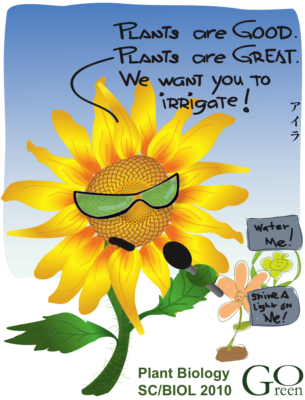
From the Undergraduate Biology Program Director: "The last day to drop a Winter 2015 term course without receiving a grade has been extended. The University will provide a firm date once academic activities resume, with sufficient notice to give students time to make informed decisions about dropping courses."
5 March 2015:
Dear Plant Biologists: I've excerpted the University Executive Committee communication below (it is
available at the Secretariat website).
Relevant to Plant Biology, a strike duration of less than 6 days is our
problem (sessional dates will remain unchanged). Of greater duration, it
will depend. For any lab write-ups that are due, it's always a good idea for
students to complete them timely (procrastination is not a good idea),
although 'official' deadlines will be extended. If a lab write-up is due
during the strike, you do not need to hand it in until after the
strike is over.
Communication from the Executive Committee of Senate (March 3, 2015): ....the Executive Committee of Senate has decided that, at the outset, all classes, examinations and related instructional activities are suspended.....
"In the case of a disruption that is six days long or shorter (defined as short disruptions by the Policy) normal academic regulations apply to all courses and related instructional activities (e.g. grading options or sessional dates). Unless a disruption goes beyond six days, individual faculty members are in the best situation to determine the extent to which their courses, seminars, graduate supervision, labs and the like have been affected and to determine what remedial action may be required. Only if the disruption goes beyond six days will it be necessary to implement more substantial remedial actions and to consider the adjustment of normal academic regulations.
When a disruption of any length occurs, students are entitled to immunity from penalty, to reasonable extensions of deadlines and to other remedies deemed necessary that are consistent with the principle of academic integrity. Such remedies do not alter academic standards. At the same time, they do not guarantee students the same learning experience they would have received in the absence of a disruption. Class schedules will not normally be reduced by more than the equivalent of one week."I very much hope for a speedy resolution of the strike. Best regards, Roger
2 March 2015: Here is a link to overheads used for the lectures on reproductive biology of angiosperms [pdf].
23 February 2014: Second Term Test Update:
The test will be held during the normal lecture hour on Friday 27 Febrary in CLH B (surnames beginning with A-L) and LAS B (surnames beginning with M-Z). Coverage will include Chapters 14, 16, 17 and 18. Lectures and past term tests provide a very useful guide to question format and coverage.
Test Instructions: You will be given a scantron sheet and the test. Please be sure to fill in your name and student ID on the scantron sheet (And, please be sure to accurately mark your answers on the scantron sheet!). When you are finished, please hand in only the scantron sheet. You can use your copy of the test to self-grade after I post the answer key on the course website.
13 February 2015: Here are overheads used for the exploration of gymnosperms [pdf], the keynote slides on tree water pumps and some more detailed notes used for the lecture on The Height of a Tree.
12 February 2015: REMINDER! The Second Term Test is Friday 27 February.
The test will cover material in Chapters 14, 16, 17 and 18. Past tests provide you with a very practical (and helpful) guide of the coverage and nature of the questions.
Similar to the first term test, it will be held in two lecture halls --details to follow-- and you will need to hand in only the scantron sheet (you can use your test to self-grade after I mount the answer key).
6 February 2015: We will continue invading land (Seedless Vascular Plants --Chapter 17) on Monday.
Here are some of the overhead diagrams used for the lectures on The Invasion of Land
5 February 2015: We will be invading land (Bryophytes --Chapter 16) on Friday.
5 February 2015: Lab Exercise Lab Quiz
Don't forget that your first lab quiz is next week. The material will include Algae, Fungi, and Bryophytes.
30 January 2015: We will continue covering the Fungal Kingdom (Chapter 14) on Monday.
Here are some of the overhead diagrams used for the Fungal Lectures.
31 January 2015: Thinking about your future career?
The Career Centre has a Career Conversation event on the 5th of February. Biology Alumni will be amongst the panelists talking about their careers. The title of the event is Careers in Science: Alternatives to Professional Schools. One of the panelists, Amro Zayed, took Plants with me in 1997/1998... Now he is a York Biology Professor! The event may give you fresh ideas about what you can do with a Biology (or other science) degree.
27 January 2014: Term Test Update:
The test will be held during the normal lecture hour on Friday 30 January in CLH B (surnames beginning with A-L) and LAS B (surnames beginning with M-Z). Coverage will include Chapters 7, 12, 13, and 15. Lectures and past term tests provide a very useful guide to question format and coverage.
One of the questions does involve a calculation. The calculation is simple, but you may use a calculator if you want to.
Test Instructions: You will be given a scantron sheet and the test. Please be sure to fill in your name and student ID on the scantron sheet (And, please be sure to accurately mark your answers on the scantron sheet!). When you are finished, please hand in only the scantron sheet. You can use your copy of the test to self-grade after I post the answer key on the course website.
23 January 2015: Term Test Reminder: Next Friday.
The first term test (Friday 30 January) will cover the material in Chapters 7, 12, 13, and 15.
Students often ask me if they "are responsible for knowing things we haven't talked about in class that are in our readings (chapters 7, 12, 13, and 15)?". The answer is yes. The lecture gives a good idea about the things I think are important, and that should be a really helpful guide. But I do ask questions about details from the chapters. The past term tests should give you a practical idea about this. There are some things that I never lecture on or ask questions about --for example, bacterial plant pathogens or viruses-- and don't plan to in the upcoming test.
Because lecture and lab material are integrated, there will be questions based on material in the lab manual. In this year's draft test, there is a question that requires you to key and identify an algae. And sometimes, a diagram or lifecycle from the manual will be shown as part of a question.
21 January 2015: Here are some of the overheads and slides used for the Algal Protist Lectures [pdf].
16 January 2015: Here are some of the overheads used for the Systematics and Prokaryote Lectures [pdf]. We will begin the algal groups (Chapter 15) next week.
8 January 2015: Biology Field Courses.
Field course sign ups for the Ontario University Program in Field Biology are now underway, with course credit via BIOL 3001 3.0. There are a wide variety of field courses to choose from. Applications for the first round are due by 30 January 2015. See Patty Lindsay (patlind@yorku.ca) in 247 Farquharson to apply for a field course. See the OUPFB website or the Department of Biology website (http://science.yorku.ca/biology/fieldcourses) for more information on available courses, costs, and how to apply.
5 January 2015: Here is a link to Wikipedia's take on The Great Oxygenation Event, caused by oxygenic photosynthesis.
UPDATE 8 January 2014: Here are versions of the keynote slides [pdf format] for the Photosynthesis Overview, Light Absorbing Pigments, and Light and Dark Reactions. Please note that no test questions are written from the slides. Past tests provide a practical guide to test coverage.
UPDATE 10 January 2014: Here are some of the overheads used for the lectures on photosynthesis [pdf format].
UPDATE 12 January 2014: Here are some of the keynote slides used for the lecture on bioengineering photosynthesis [pdf format].
9 January 2015: Lab 1 (Photosynthesis) next week (12-16 January)
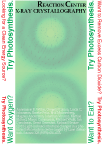
Please remember to bring your safety glasses. In case you haven't gotten the lab manual, here is the photosynthesis lab exercise [pdf].
1 January 2015:
To: SC/BIOL 2010 Plant Biologists
Dear Everyone: Welcome to SC/BIOL 2010 Plant Biology! The TAs, lab technician and I are looking forward to seeing you!
Please note that course announcements and useful resources for the course are available here at the public-facing course website (the Moodle website is used for lab marks and lab group announcements).
The textbook and lab manual are available in the Bookstore.
The textbook (Raven Biology of Plants, 8th edition) is central to both lectures and labs. The lab manual is required for labs. The textbook is available either hardcover or in a cheaper 'looseleaf' format (just the relevant chapter(s) can be brought to the labs, making life lighter).
Labs begin the week of 12-16 January: See Lab Information and Scheduling
Term Test dates have been set for Friday 30 January and Friday 27 February: More Information about Tests
With best wishes for the New Year, Roger Lew (Course Director for Plant Biology)
18 December 2014: Information is available about Biology Field Courses being offered in the new year.
28 November 2014: Textbook and lab manual are available in the Bookstore.
The textbook (Raven Biology of Plants, 8th edition) is central to both lectures and labs. The lab manual is required for labs. The textbook is available either hardcover or in a cheaper 'looseleaf' format (not shown --just the relevant chapter(s) can be brought to the labs, making life lighter). Some students find the Photographic Atlas for Botany useful for the diversity and anatomy lab exercises.
2014 Archives
16 April 2014:
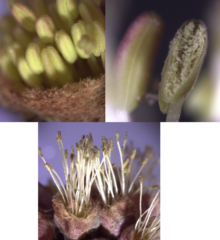 Thank you for making this such an enjoyable course! I hope that you enjoy the emerging spring
all around us (such as maples flowering next to the Boyer Woodlot)!
Thank you for making this such an enjoyable course! I hope that you enjoy the emerging spring
all around us (such as maples flowering next to the Boyer Woodlot)!
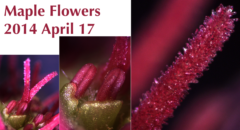
25 April 2014: Science Rendezvous Outreach: Call for Volunteers.
Science Rendezvous is an international science outreach event that happens every second weekend in May (Saturday 10 May from 10:00 to 3:00). It's an opportunity for scientists to engage the general public about sciency things. This year at Main Street Markham, the organizers are planning to give the public the chance to Bring a Fern Baby Home for Mother's Day based on the fern lab exercise from the Plant Biology course. I am hoping that Plant Biology students are willing to volunteer! If so, please email Jessica Vaisica (jvaisica@yorku.ca), who will provide more details.
Update (13 May 2012): The Science Rendezvous event at Main Street Markham went very well! I think the public was amazed! There was a lot of interest in the Fern Babies for Mother's Day event. Chantal Blanchard from Zeiss did a wonderful job providing a microscopic view of swimming spermatazoids and streaming Chara. A lot of visitors took their plates home to grow baby ferns! Thanks to All the Volunteers!
4 April 2014: Economic Botany. Here is a link to overheads used for the lecture on coffee and peanut domestication [pdf].
1 April 2014: Economic Botany. Here is a link to overheads and notes used for the lecture on barley domestication [pdf].
1 April 2014: Course Evaluation Just a reminder that there is a departmental online evaluation available for the course (you will need to log in using Passport York).
31 March 2014: Here is a link to overheads used for the lectures on shoot biology of angiosperms [pdf].
30 March 2014: Lab Exercise Reminder
The fruit/vegetable dissection project (bonus marks) will be the week of 31 March -- 4 April. You will need to bring:Do not eat your experiment! It's basic lab safety practice.
- your choice of a fruit or vegetable.
- a print-out of nutritional information for your selection.
- you will need to dissect the fruit/vegetable using the same techniques you used to dissect your flowering plant and submit a drawing.
27 March 2014:
 Finally, some evidence of spring! Populus (trembling aspen) flowers starting to break bud... In 2012, they started to break bud
about the 7th of March ([photographic evidence]). Last year, Acer saccharinum
(silver maple) was flowering by now ([photographic evidence]), but no sign of bud break
when I checked today.
Finally, some evidence of spring! Populus (trembling aspen) flowers starting to break bud... In 2012, they started to break bud
about the 7th of March ([photographic evidence]). Last year, Acer saccharinum
(silver maple) was flowering by now ([photographic evidence]), but no sign of bud break
when I checked today.
26 March 2014: Here is a link to overheads used for the lectures on root biology of angiosperms [pdf].
22 March 2014: Lab Exercises Reminders
- Second Lab Quiz this week (24-28 March)
- You will be continuing your Angiosperm Anatomy project
- The Angiosperm Write-Up is due next week (31 March -- 4 April). Your TAs will provide you with the marking scheme.
- The fruit/vegetable dissection project (bonus marks)
will be the week of 31 March -- 4 April. You will need to bring:
- your choice of a fruit or vegetable.
- a print-out of nutritional information for your selection.
- you will need to dissect the fruit/vegetable using the same techniques you used to dissect your flowering plant and submit a drawing.
17 March 2014: Here is a link to overheads used for the lectures on seed biology of angiosperms [pdf].
10 March 2014: Lab Exercises Here is the rubric for the Pollen Tube Growth Lab report.
10 March 2014: Lab Exercises Reminders
- Don't forget you will need to bring a plant to next week's lab (and a dissecting kit)
- Your TAs will provide you with more details
- The second lab quiz will be the week of 24-28 March.
7 March 2014: Here is a link to overheads used for the lectures on reproductive biology of angiosperms [pdf].
6 March 2014: Here is a link to a short review of incompatibility mechanisms in flowering plants by Simon Hiscock --Pollen recognition during the self-incompatibility response in plants-- that you may find helpful.
4 March 2014: Lab Exercises The second lab quiz will be the week of 24-28 March.
2 March 2014: Lab Exercises Fungal Sex and Pollen Identification
- Here is the rubric for your Fungal Sex Lab Report [pdf].
- Here are explanations of observational techniques [pdf] that you will find helpful in identifying pollen.
24 February 2014: Lab Exercises C-Fern Babies!
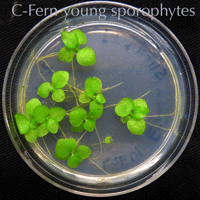
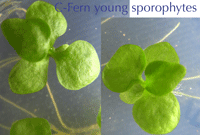
You can take home the Ceratopteris C-Ferns that you fertilized before Reading Week. Growing instructions are provided in the teaching lab, and available in the Phyto-File section of the course website (describing how we use C-Ferns in Science Outreach). The C-Ferns are from Erissa in the Monday afternoon lab
21 February 2014: Here are overheads used for the exploration of gymnosperms [pdf].
14 February 2014: Here are the keynote slides on tree water pumps and some more detailed notes used for the lecture on The Height of a Tree.
12 February 2014: Here are the keynote slides on seedless vascular plants and some of the overhead diagrams used for the lectures on The Invasion of Land...
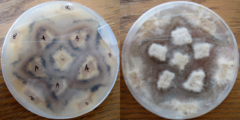 11 February 2014: Lab Exercises Fungal Sex
11 February 2014: Lab Exercises Fungal Sex
Here is an example of an artistic layout to create an example of crosses between the Neurospora crassa mating types A and a (Courtesy of your lab technician Agnes Szelag).
10 February 2014: Here are the keynote slides on bryophytes.
Here are links to the youtube videos I showed in class: walking through the bog and an 'instructive' video.We have evolved into seedless vascular plants (Chapter 17).
6 February 2014: We have started to invade land (Bryophytes --Chapter 16).
3 February 2014: Here are the keynote slides on fungal growth and some of the overhead diagrams used for the Fungal Lectures.
24 January 2014: Here are the keynote slides for the Algal Protist Groups [pdf].
20 January 2014: Here are some of the overheads used for the Algal Protist Lectures [pdf].
17 January 2014: Here are some of the overheads used for the Systematics and Prokaryote Lectures [pdf]. We will begin the algal groups (Chapter 15) next week.
16 January 2014: Here are the keynote slides for the Bacterial Motility [pdf].
13 January 2014: Some of the lab exercises (including the photosynthesis lab) require statistical analysis, for which the lab coordinator Chris Luszczek has provided a Statistics Tutorial also available in pdf format.
10 January 2014: Here are the keynote slides for the Light and Dark Reactions [pdf].
8 January 2014: Here are the keynote slides for the Light Absorbing Pigments [pdf].
6 January 2014: Here are the keynote slides for the Photosynthesis Overview [pdf].
4 January 2014: Mazen Hamadeh (Bethune Academic Advisor) asked me to remind students that Bethune College offers Free Peer Tutoring and Study Sessions for multiple BIOL, CHEM, CSE, MATH, and PHYS courses. All to help students do better in their studies!
Bethune College offers a range of servces for students through the Student Ombuds Services (SOS):
2013 Archives
23 April 2013: Science Rendezvous Outreach: Call for Volunteers.
Science Rendezvous is an international science outreach event that happens every second weekend in May (Saturday 11 May from 10:00 to 3:00). It's an opportunity for scientists to engage the general public about sciency things. This year at Main Street Markham, the organizers are planning to give the public the chance to Bring a Fern Baby Home for Mother's Day based on the fern lab exercise from the Plant Biology course. I am hoping that Plant Biology students are willing to volunteer! If so, please email Margaret Hough (mhough@yorku.ca), who will provide more details.Update (13 May 2012): The Science Rendezvous event at Main Street Markham was a tremendous success! For the Fern Babies for Mother's Day event, the public could add water to Petri plates with 3 week old gametophytes and observe the spermatazoids swim to the hermaphrodites. Plus, they could take the plates home with them to grow baby ferns! Thanks to All the Volunteers!
16 April 2013:
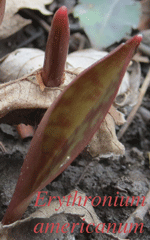 Thank you for making this such an enjoyable course! I hope that you enjoy the emerging spring
all around us (such as 'adder's tongue' just coming up in the Boyer Woodlot)!
Thank you for making this such an enjoyable course! I hope that you enjoy the emerging spring
all around us (such as 'adder's tongue' just coming up in the Boyer Woodlot)!
26 April 2013 Update:And now, even the Trilliums are coming up!
8 April 2013: Here is a link to overheads used for the shoot emergence and flowering of angiosperms [pdf].
5 April 2013: Maple pollen!
Silver maples (Acer saccharinum) are near their peak. Inderjit Dass generously isolated the pollen in the plants teaching lab to share with everyone.
3 April 2013: Here is a link to overheads used for the radicle emergence of angiosperms [pdf].
3 April 2011: The final exam will be held Thursday 11 April from 7:00 PM to 10:00 PM in ACW 206.
I have been asked by some students for advice about study strategies for the final exam. In general, material from the first part of the course (on Diversity) is based on textbook (mainly Chapters 7, 13, 14, 15, 16, 17 and 18). Your lecture notes will certainly be helpful, as will the term tests (which are designed to prepare you for the diversity section of the final exam). Questions from your term tests are often used, but may be modified, so please read the questions carefully. For the last section of the course (on The Life of a Plant), the material covered in lecture ranges over many chapters in the textbook. For this section of the course, test questions are drawn from lecture material (and sometimes are analytical in nature, asking you to interpret novel data). What this means in terms of study strategies is that you should be familiar with the key chapters (19, 20 and 22). In addition, some lecture material is covered in later chapters in the textbook. For example, you can read the sections in the textbook on phytochrome (page numbers are provided in the index) and annotate your lecture notes as you deem appropriate. Similarly root emergence, gravitropism, etc., are all described in the textbook, most easily found using the index. These sections should reinforce the coverage in lecture. I hope this is helpful (and hope you do well on the final).
28 March 2013: Maples flower!
Silver maples (Acer saccharinum) are one of the first flowerers in the spring, and later than usual because of the cold spring (they flowered about the 13th of March last year, although that was a warmer spring than usual). Maple flowers are a clear covenant for a spring soon to arrive.
25 March 2013: Here is a link to overheads used for the seed biology of angiosperms [pdf].
20 March 2013: For today's lecture on triggers to seed germination, here is a link to the original article Seasonal changes in the temperature requirements for germination of buried seeds of Aphanes arvensis L. (Roberts and Neilson [1982] New Phytologist 92:159-166) [pdf].
The data shown in class [pdf] was simplified compared to the data shown in the paper.
19 March 2013: Here is a link to overheads used for the reproductive biology of angiosperms [pdf].
5 March 2013: Here are the overheads used for the exploration of gymnosperms [pdf].
1 March 2013: Here are the overheads used for the exploration of evaporative pumps [pdf].
28 February 2013: We will begin to explore seed plants (Gymnosperms --Chapter 18) on Friday.
Here is a link to overheads used for the invasion of land [pdf].
18 February 2013: Walking on a bog.
The best video I could find is walking through the bog [youtube] from a northern bog in Minnesota (thus similar to the bogs that occur on the Canadian Shield --about 100 km north of Toronto). Here is a more 'instructive' video.
14 February 2013: We will begin to invade land (Bryophytes --Chapter 16) on Friday.
Here is a link to overheads used for the Fungal Lectures [pdf].
12 February 2013: We will finish our exploration of the decomposers (Fungi -- Chapter 14) on Wednesday, and may begin to invade land (Bryophytes --Chapter 16).
Test Addendum: Some students have been asking me about the posted test scores. To clarify, the posted scores include the adjustment.
7 February 2013 (Lab Exercises): Fern sporophytes
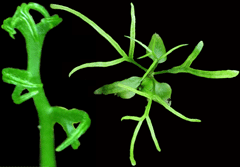
In a few weeks, your successfully fertilized fern gametophytes will begin to develop the sporophyte (diploid) alternate generation. The photo shows an example of a more mature sporophyte (an unfurling frond and the whole plant), something you will have the opportunity to observe for yourself, if you decide to take your fern babies home after you complete the fern lab. A more complete documentation of sporophyte development is in the Miscellanea section of the course website.
4 February 2013: We will begin our exploration of the decomposers (Fungi -- Chapter 14) on Wednesday.
31 January 2013: Protista Lectures.
Here is a link to overheads and slides used for the Protista Lectures [pdf]
29 January 2013: Term Test Update: The test will be held during the normal lecture hour on Monday 4 February in ACW 005 (surnames beginning with A-K) and ACW 004 (surnames beginning with L-Z). Coverage will include Chapters 7, 12, 13, and 15. Lectures provide a good guide to coverage. One or two questions are specifically from lecture, one includes a diagram from your lab manual, the others are drawn from the textbook. Past tests do provide a guide to question format and coverage.
Update (1 February): One of the questions does involve a calculation. The calculation is simple, but you may use a calculator if you want.
27 January 2013: We will continue exploring the Protists (Chlorophyta and Heterotrophs) next week.
The first term test (4 February) will cover the material in Chapters 7, 12, 13, and 15.Update (28 January 2013). I've been getting questions from students along the lines of "are we responsible for knowing things we haven't talked about in class that are in our readings (chapters 7, 12 ,13, and 15)?". The answer is yes. The lecture gives a good idea about the things I think are important, and that should be a really helpful guide. But I do ask questions about details from the chapters. The past term tests should give you a practical idea about this. You will notice --for example-- that I never ask questions about bacterial plant pathogens or viruses (and don't plan to in the upcoming test).
18 January 2013: Here is a link to overheads used for the Systematics and Prokaryote Lectures [pdf]. We will begin the algal groups (Chapter 15) next week.
14 January 2013: Wednesday, we will overview The Science of Biological Diversity.

Linneaus Philosophia Botanica
and introduce the bacteria.
9 January 2013: Lab 1 (Photosynthesis) next week (14-18 January)

Please remember to bring your safety glasses. In case you haven't gotten the lab manual, here is the photosynthesis lab exercise [pdf].
2012 Archives
12 april 2012: Science Rendezvous Outreach: Call for Volunteers.
Science Rendezvous is an international science outreach event that happens every second weekend in May (Saturday 12 May from 10:00 to 3:00). It's an opportunity for scientists to engage the general public about sciency things. This year at Main Street Markham, the organizers are planning to give the public the chance to do the Sex in a Dish lab exercise from the Plant Biology course. I am hoping that Plant Biology students are willing to volunteer! If so, the attached [pdf] provides more details and contact information.
Update (15 May 2012): The Science Rendezvous event at Main Street Markham was a tremendous success! For the Sex in a Dish event, the public could add water to Petri plates with 3 week old gametophytes and observe the spermatazoids swim to the hermaphrodites. Plus, they could take the plates home with them to grow baby ferns! Thanks to All the Volunteers!
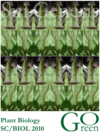 5 april 2012:
Thank you all for making this an enjoyable course. Please do enjoy the unique Plantae Diversitas all around you during the rest of
the year!
5 april 2012:
Thank you all for making this an enjoyable course. Please do enjoy the unique Plantae Diversitas all around you during the rest of
the year!
18 january 2012: Here are some links to movies of diatom gliders.
- From soil in a drainage seep [2.8M .mov format] east of the Schulich Business School.
- From Black Creek [422 kB .mov format] west of the University. A centric is riding piggyback on a pennate
